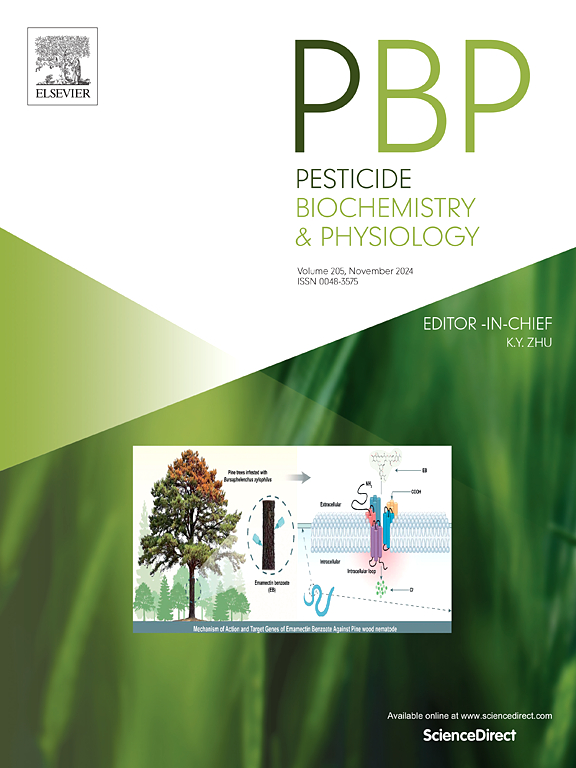洞察某些精油对库蚊幼虫的生化、遗传毒性和分子影响,以及基于分子对接分析的可能作用机制
IF 4.2
1区 农林科学
Q2 BIOCHEMISTRY & MOLECULAR BIOLOGY
引用次数: 0
摘要
蚊子作为威胁生命的疾病的传播媒介,对人类健康构成重大风险。虽然精油越来越多地被用作潜在的灭蚊剂,但其对蚊子的特定生化、基因毒性和分子影响尚未得到充分的记录。本研究评价了5种EOs对淡库蚊幼虫的生化、遗传毒性和分子效应。用橙、黑胡椒、樟脑、柠檬和檀香精油处理晚3龄幼虫24 h。生化研究表明,这些EOs增强了α-酯酶、谷胱甘肽s -转移酶和过氧化物酶的活性,同时降低了总蛋白、脂肪和碳水化合物含量以及淀粉酶、转化酶和海藻化酶的活性。乙酰胆碱酯酶、蛋白酶、过氧化氢酶、酸性磷酸酶和碱性磷酸酶的活性依赖于eo。彗星分析显示,彗星参数略有增加,包括尾%,尾长,尾中DNA %,尾力矩和橄榄尾力矩,表明低至轻度DNA损伤。使用橙和黑胡椒进行的基因表达研究表明,与免疫、解毒、代谢和感觉知觉相关的基因显著上调。分子对接分析显示,橙油的主要成分d-柠檬烯与其靶蛋白具有显著的结合亲和性,其与凋亡抑制蛋白、自噬抑制蛋白、幼年激素蛋白和章鱼胺受体的结合能分别为- 4.87、- 6.33、- 5.82和- 3.38 kcal/mol。这些发现突出了d-柠檬烯作为一种有效抑制剂的潜力,在受体的活性位点具有良好的相互作用。该研究揭示了EO毒性的可能机制,为开发生态友好型蚊虫防治策略提供了有希望的方向。本文章由计算机程序翻译,如有差异,请以英文原文为准。

Insights into biochemical, genotoxic, and molecular impacts, and molecular docking analysis-based possible mechanism of action of some essential oils against Culex pipiens larvae
Mosquitoes as vectors of life-threatening diseases pose significant risks to human health. While essential oils (EOs) are increasingly utilized as potential mosquitocides, their specific biochemical, genotoxic, and molecular impacts on mosquitoes are not well-documented. This study evaluates the biochemical, genotoxic, and molecular effects of five EOs on Culex pipiens larvae. Late third-instar larvae were treated for 24 h with LC50 of orange, black pepper, camphor, lemon, and sandalwood EOs. Biochemical studies revealed that these EOs enhanced α-esterase, glutathione S-transferase, and peroxidase activities while reducing total protein, lipid, and carbohydrate contents and amylase, invertase, and trehalase activities. Acetylcholinesterase, protease, catalase, acid phosphatase, and alkaline phosphatase activities were EO-dependent. The comet assay revealed a slight increase in comet parameters, including tailed %, tail length, % DNA in the tail, tail moment, and olive tail moment, indicating low to mild DNA damage. Gene expression studies using orange and black pepper EOs demonstrated significant upregulation of genes related to immunity, detoxification, metabolism, and sensory perception. Molecular docking analysis revealed significant binding affinities between d-Limonene, the major component of orange oil, and its target proteins, with binding energies of −4.87, −6.33, −5.82, and − 3.38 kcal/mol for inhibitor of apoptosis protein, autophagy, juvenile hormone protein, and octopamine receptor, respectively. These findings highlight the potential of d-Limonene as an effective inhibitor, with favorable interactions at the receptor's active sites. This study provides insights into the possible mechanism of EO toxicity, offering promising directions for developing eco-friendly mosquito control strategies.
求助全文
通过发布文献求助,成功后即可免费获取论文全文。
去求助
来源期刊
CiteScore
7.00
自引率
8.50%
发文量
238
审稿时长
4.2 months
期刊介绍:
Pesticide Biochemistry and Physiology publishes original scientific articles pertaining to the mode of action of plant protection agents such as insecticides, fungicides, herbicides, and similar compounds, including nonlethal pest control agents, biosynthesis of pheromones, hormones, and plant resistance agents. Manuscripts may include a biochemical, physiological, or molecular study for an understanding of comparative toxicology or selective toxicity of both target and nontarget organisms. Particular interest will be given to studies on the molecular biology of pest control, toxicology, and pesticide resistance.
Research Areas Emphasized Include the Biochemistry and Physiology of:
• Comparative toxicity
• Mode of action
• Pathophysiology
• Plant growth regulators
• Resistance
• Other effects of pesticides on both parasites and hosts.

 求助内容:
求助内容: 应助结果提醒方式:
应助结果提醒方式:


